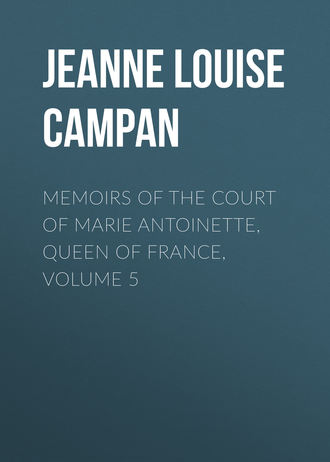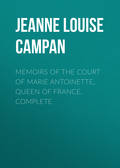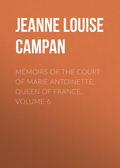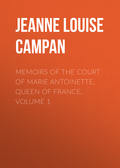
Jeanne Louise Henriette Campan
Memoirs of the Court of Marie Antoinette, Queen of France, Volume 5
His other plan was that the King should make himself master of the revolution before its complete explosion; he advised his Majesty to go to the Assembly, and there, in person, to demand the cahiers,
[Cahiers, the memorials or lists of complaints, grievances, and requirements of the electors drawn up by the primary assemblies and sent with the deputies.]
and to make the greatest sacrifices to satisfy the legitimate wishes of the people, and not to give the factious time to enlist them in aid of their criminal designs. Madame Adelaide had M. Foulon's two memorials read to her in the presence of four or five persons. One of them, Comte Louis de Narbonne, was very intimate with Madame de Stael, and that intimacy gave the Queen reason to believe that the opposite party had gained information of M. Foulon's schemes.
It is known that young Barnave, during an aberration of mind, since expiated by sincere repentance, and even by death, uttered these atrocious words: "Is then the blood now, flowing so pure?" when M. Berthier's son came to the Assembly to implore the eloquence of M. de Lally to entreat that body to save his father's life. I have since been informed that a son of M. Foulon, having returned to France after these first ebullitions of the Revolution, saw Barnave, and gave him one of those memorials in which M. Foulon advised Louis XVI. to prevent the revolutionary explosion by voluntarily granting all that the Assembly required before the 14th of July. "Read this memorial," said he; "I have brought it to increase your remorse: it is the only revenge I wish to inflict on you." Barnave burst into tears, and said to him all that the profoundest grief could dictate.
CHAPTER II
After the 14th of July, by a manoeuvre for which the most skilful factions of any age might have envied the Assembly, the whole population of France was armed and organised into a National Guard. A report was spread throughout France on the same day, and almost at the same hour, that four thousand brigands were marching towards such towns or villages as it was wished to induce to take arms. Never was any plan better laid; terror spread at the same moment all over the kingdom. In 1791 a peasant showed me a steep rock in the mountains of the Mont d'Or on which his wife concealed herself on the day when the four thousand brigands were to attack their village, and told me they had been obliged to make use of ropes to let her down from the height which fear alone had enabled her to climb.
Versailles was certainly the place where the national military uniform appeared most offensive. All the King's valets, even of the lowest class, were metamorphosed into lieutenants or captains; almost all the musicians of the chapel ventured one day to make their appearance at the King's mass in a military costume; and an Italian soprano adopted the uniform of a grenadier captain. The King was very much offended at this conduct, and forbade his servants to appear in his presence in so unsuitable a dress.
The departure of the Duchesse de Polignac naturally left the Abbe de Vermond exposed to all the dangers of favouritism. He was already talked of as an adviser dangerous to the nation. The Queen was alarmed at it, and recommended him to remove to Valenciennes, where Count Esterhazy was in command. He was obliged to leave that place in a few days and set off for Vienna, where he remained.
On the night of the 17th of July the Queen, being unable to sleep, made me watch by her until three in the morning. I was extremely surprised to hear her say that it would be a very long time before the Abbe de Vermond would make his appearance at Court again, even if the existing ferment should subside, because he would not readily be forgiven for his attachment to the Archbishop of Sens; and that she had lost in him a very devoted servant. Then she suddenly remarked to me, that although he was not much prejudiced against me I could not have much regard for him, because he could not bear my father-in-law to hold the place of secretary of the closet. She went on to say that I must have studied the Abbe's character, and, as I had sometimes drawn her portraits of living characters, in imitation of those which were fashionable in the time of Louis XIV., she desired me to sketch that of the Abbe, without any reserve. My astonishment was extreme; the Queen spoke of the man who, the day before, had been in the greatest intimacy with her with the utmost coolness, and as a person whom, perhaps, she might never see again! I remained petrified; the Queen persisted, and told me that he had been the enemy of my family for more than twelve years, without having been able to injure it in her opinion; so that I had no occasion to dread his return, however severely I might depict him. I promptly summarised my ideas about the favourite; but I only remember that the portrait was drawn with sincerity, except that everything which could denote antipathy was kept out of it. I shall make but one extract from it: I said that he had been born talkative and indiscreet, and had assumed a character of singularity and abruptness in order to conceal those two failings. The Queen interrupted me by saying, "Ah! how true that is!" I have since discovered that, notwithstanding the high favour which the Abbe de Vermond enjoyed, the Queen took precautions to guard herself against an ascendency the consequences of which she could not calculate.
On the death of my father-in-law his executors placed in my hands a box containing a few jewels deposited by the Queen with M. Campan on the departure from Versailles of the 6th of October, and two sealed packets, each inscribed, "Campan will take care of these papers for me." I took the two packets to her Majesty, who kept the jewels and the larger packet, and, returning me the smaller, said, "Take care of that for me as your father-in-law did."
After the fatal 10th of August, 1792,—[The day of the attack on the Tuileries, slaughter of the Swiss guard, and suspension of the King from his functions.]—when my house was about to be surrounded, I determined to burn the most interesting papers of which I was the depositary; I thought it my duty, however, to open this packet, which it might perhaps be necessary for me to preserve at all hazards. I saw that it contained a letter from the Abbe de Vermond to the Queen. I have already related that in the earlier days of Madame de Polignac's favour he determined to remove from Versailles, and that the Queen recalled him by means of the Comte de Mercy. This letter contained nothing but certain conditions for his return; it was the most whimsical of treaties; I confess I greatly regretted being under the necessity of destroying it. He reproached the Queen for her infatuation for the Comtesse Jules, her family, and society; and told her several truths about the possible consequences of a friendship which ranked that lady among the favourites of the Queens of France, a title always disliked by the nation. He complained that his advice was neglected, and then came to the conditions of his return to Versailles; after strong assurances that he would never, in all his life, aim at the higher church dignities, he said that he delighted in an unbounded confidence; and that he asked but two things of her Majesty as essential: the first was, not to give him her orders through any third person, and to write to him herself; he complained much that he had had no letter in her own hand since he had left Vienna; then he demanded of her an income of eighty thousand livres, in ecclesiastical benefices; and concluded by saying that, if she condescended to assure him herself that she would set about procuring him what he wished, her letter would be sufficient in itself to show him that her Majesty had accepted the two conditions he ventured to make respecting his return. No doubt the letter was written; at least it is very certain that the benefices were granted, and that his absence from Versailles lasted only a single week.
In the course of July, 1789, the regiment of French guards, which had been in a state of insurrection from the latter end of June, abandoned its colours. One single company of grenadiers remained faithful, to its post at Versailles. M. le Baron de Leval was the captain of this company. He came every evening to request me to give the Queen an account of the disposition of his soldiers; but M. de La Fayette having sent them a note, they all deserted during the night and joined their comrades, who were enrolled in the Paris guard; so that Louis XVI. on rising saw no guard whatever at the various posts entrusted to them.
The decrees of the 4th of August, by which all privileges were abolished, are well known.
["It was during the night of the 4th of August," says Rivarol, "that the demagogues of the nobility, wearied with a protracted discussion upon the rights of man, and burning to signalise their zeal, rose all at once, and with loud exclamations called for the last sighs of the feudal system. This demand electrified the Assembly. All heads were frenzied. The younger sons of good families, having nothing, were delighted to sacrifice their too fortunate elders upon the altar of the country; a few country cures felt no less pleasure in renouncing the benefices of others; but what posterity will hardly believe is that the same enthusiasm infected the whole nobility; zeal walked hand in hand with malevolence; they made sacrifice upon sacrifice. And as in Japan the point of honour lies in a man's killing himself in the presence of the person who has offended him, so did the deputies of the nobility vie in striking at themselves and their constituents. The people who were present at this noble contest increased the intoxication of their new allies by their shouts; and the deputies of the commons, seeing that this memorable night would only afford them profit without honour, consoled their self-love by wondering at what Nobility, grafted upon the Third Estate, could do. They named that night the 'night of dupes'; the nobles called it the 'night of sacrifices'."—NOTE BY THE EDITOR.]
The King sanctioned all that tended to the diminution of his own personal gratifications, but refused his consent to the other decrees of that tumultuous night; this refusal was one of the chief causes of the ferments of the month of October.
In the early part of September meetings were held at the Palais Royal, and propositions made to go to Versailles; it was said to be necessary to separate the King from his evil counsellors, and keep him, as well as the Dauphin, at the Louvre. The proclamations by the officers of the commune for the restoration of tranquillity were ineffectual; but M. de La Fayette succeeded this time in dispersing the populace. The Assembly declared itself permanent; and during the whole of September, in which no doubt the preparations were made for the great insurrections of the following month, the Court was not disturbed.
The King had the Flanders regiment removed to Versailles; unfortunately the idea of the officers of that regiment fraternising with the Body Guards was conceived, and the latter invited the former to a dinner, which was given in the great theatre of Versailles, and not in the Salon of Hercules, as some chroniclers say. Boxes were appropriated to various persons who wished to be present at this entertainment. The Queen told me she had been advised to make her appearance on the occasion, but that under existing circumstances she thought such a step might do more harm than good; and that, moreover, neither she nor the King ought directly to have anything to do with such a festival. She ordered me to go, and desired me to observe everything closely, in order to give a faithful account of the whole affair.
The tables were set out upon the stage; at them were placed one of the Body Guard and an officer of the Flanders regiment alternately. There was a numerous orchestra in the room, and the boxes were filled with spectators. The air, "O Richard, O mon Roi!" was played, and shouts of "Vive de Roi!" shook the roof for several minutes. I had with me one of my nieces, and a young person brought up with Madame by her Majesty. They were crying "Vive le Roi!" with all their might when a deputy of the Third Estate, who was in the next box to mine, and whom I had never seen, called to them, and reproached them for their exclamations; it hurt him, he said, to see young and handsome Frenchwomen brought up in such servile habits, screaming so outrageously for the life of one man, and with true fanaticism exalting him in their hearts above even their dearest relations; he told them what contempt worthy American women would feel on seeing Frenchwomen thus corrupted from their earliest infancy. My niece replied with tolerable spirit, and I requested the deputy to put an end to the subject, which could by no means afford him any satisfaction, inasmuch as the young persons who were with me lived, as well as myself, for the sole purpose of serving and loving the King. While I was speaking what was my astonishment at seeing the King, the Queen, and the Dauphin enter the chamber! It was M. de Luxembourg who had effected this change in the Queen's determination.
The enthusiasm became general; the moment their Majesties arrived the orchestra repeated the air I have just mentioned, and afterwards played a song in the "Deserter," "Can we grieve those whom we love?" which also made a powerful impression upon those present: on all sides were heard praises of their Majesties, exclamations of affection, expressions of regret for what they had suffered, clapping of hands, and shouts of "Vive le Roi! Vive la Reine! Vive le Dauphin!" It has been said that white cockades were worn on this occasion; that was not the case; the fact is, that a few young men belonging to the National Guard of Versailles, who were invited to the entertainment, turned the white lining of their national cockades outwards. All the military men quitted the hall, and reconducted the King and his family to their apartments. There was intoxication in these ebullitions of joy: a thousand extravagances were committed by the military, and many of them danced under the King's windows; a soldier belonging to the Flanders regiment climbed up to the balcony of the King's chamber in order to shout "Vive le Roi!" nearer his Majesty; this very soldier, as I have been told by several officers of the corps, was one of the first and most dangerous of their insurgents in the riots of the 5th and 6th of October. On the same evening another soldier of that regiment killed himself with a sword. One of my relations, chaplain to the Queen, who supped with me, saw him stretched out in a corner of the Place d'Armes; he went to him to give him spiritual assistance, and received his confession and his last sighs. He destroyed himself out of regret at having suffered himself to be corrupted by the enemies of his King, and said that, since he had seen him and the Queen and the Dauphin, remorse had turned his brain.
I returned home, delighted with all that I had seen.
I found a great many people there. M. de Beaumetz, deputy for Arras, listened to my description with a chilling air, and, when I had finished, told me that all that had passed was terrific; that he knew the disposition of the Assembly, and that the greatest misfortunes would follow the drama of that night; and he begged my leave to withdraw that he might take time for deliberate reflection whether he should on the very next day emigrate, or pass over to the left side of the Assembly. He adopted the latter course, and never appeared again among my associates.
On the 2d of October the military entertainment was followed up by a breakfast given at the hotel of the Body Guards. It is said that a discussion took place whether they should not march against the Assembly; but I am utterly ignorant of what passed at that breakfast. From that moment Paris was constantly in commotion; there were continual mobs, and the most virulent proposals were heard in all public places; the conversation was invariably about proceeding to Versailles. The King and Queen did not seem apprehensive of such a measure, and took no precaution against it; even when the army had actually left Paris, on the evening of the 5th of October, the King was shooting at Meudon, and the Queen was alone in her gardens at Trianon, which she then beheld for the last time in her life. She was sitting in her grotto absorbed in painful reflection, when she received a note from the Comte de Saint-Priest, entreating her to return to Versailles. M. de Cubieres at the same time went off to request the King to leave his sport and return to the palace; the King did so on horseback, and very leisurely. A few minutes afterwards he was informed that a numerous body of women, which preceded the Parisian army, was at Chaville, at the entrance of the avenue from Paris.
The scarcity of bread and the entertainment of the Body Guards were the pretexts for the insurrection of the 5th and 6th of October, 1789; but it is clear to demonstration that this new movement of the people was a part of the original plan of the factious, insomuch as, ever since the beginning of September, a report had been industriously circulated that the King intended to withdraw, with his family and ministers, to some stronghold; and at all the popular assemblies there had been always a great deal said about going to Versailles to seize the King.
At first only women showed themselves; the latticed doors of the Chateau were closed, and the Body Guard and Flanders regiment were drawn up in the Place d'Armes. As the details of that dreadful day are given with precision in several works, I will only observe that general consternation and disorder reigned throughout the interior of the palace.
I was not in attendance on the Queen at this time. M. Campan remained with her till two in the morning. As he was leaving her she condescendingly, and with infinite kindness, desired him to make me easy as to the dangers of the moment, and to repeat to me M. de La Fayette's own words, which he had just used on soliciting the royal family to retire to bed, undertaking to answer for his army.
The Queen was far from relying upon M. de La Fayette's loyalty; but she has often told me that she believed on that day, that La Fayette, having affirmed to the King, in the presence of a crowd of witnesses, that he would answer for the army of Paris, would not risk his honour as a commander, and was sure of being able to redeem his pledge. She also thought the Parisian army was devoted to him, and that all he said about his being forced to march upon Versailles was mere pretence.
On the first intimation of the march of the Parisians, the Comte de Saint-Priest prepared Rambouillet for the reception of the King, his family, and suite, and the carriages were even drawn out; but a few cries of "Vive le Roi!" when the women reported his Majesty's favourable answer, occasioned the intention of going away to be given up, and orders were given to the troops to withdraw.
[Compare this account with the particulars given in the "Memoirs" of Ferribres, Weber, Bailly, and Saint-Priest, from the latter of which the following sentence is taken:
"M. d'Estaing knew not what to do with the Body Guards beyond bringing them into the courtyard of the ministers, and shutting the grilles. Thence they proceeded to the terrace of the Chateau, then to Trianon, and lastly to Rambouillet.
"I could not refrain from expressing to M. d'Estaing, when he came to the King, my astonishment at not seeing him make any military disposition. 'Monsieur,' replied he, 'I await the orders of the King' (who did not open his mouth). 'When the King gives no orders,' pursued I, 'a general should decide for himself in a soldierly manner.' This observation remained unanswered."]
The Body Guards were, however, assailed with stones and musketry while they were passing from the Place d'Armes to, their hotel. Alarm revived; again it was thought necessary that the royal family should go away; some carriages still remained ready for travelling; they were called for; they were stopped by a wretched player belonging to the theatre of the town, seconded by the mob: the opportunity for flight had been lost.





